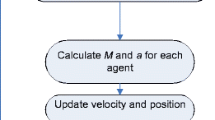Abstract
Gravitational Search Algorithm (GSA) is a recent metaheuristic algorithm inspired by Newton’s law of gravity and law of motion. In this search process, position change is based on the calculation of step size which depends upon a constant namely, Gravitational Constant (G). G is an exponentially decreasing function throughout the search process. Further, in-spite of having different masses, the value of G remains same for each agent, which may cause inappropriate step size of agents for the next move, and thus leads the swarm toward stagnation or sometimes skipping the true optima. To overcome stagnation, we first propose a gravitational constant having different scaling characteristics for different phase of the search process. Secondly, a dynamic behavior is introduced in this proposed gravitational constant which varies according to the fitness of the agents. Due to this behavior, the gravitational constant will be different for every agent based on its fitness and thus will help in controlling the acceleration and step sizes of the agents which further improve exploration and exploitation of the solution search space. The proposed strategy is tested over 23 well-known classical benchmark functions and 11 shifted and biased benchmark functions. Various statistical analyzes and a comparative study with original GSA, Chaos-based GSA (CGSA), Bio-geography Based Optimization (BBO) and DBBO has been carried out.







Similar content being viewed by others
References
Amoozegar M, Rashedi E (2014) Parameter tuning of gsa using doe. In: 2014 4th international conference on computer and knowledge engineering (ICCKE), pp 431–436
Bansal JC, Farswan P (2017) A novel disruption in biogeography-based optimization with application to optimal power flow problem. Appl Intell 46(3):590–615
Chen H, Li S, Tang Z (2011) Hybrid gravitational search algorithm with random-key encoding scheme combined with simulated annealing. IJCSNS 11(6):208
Doraghinejad M, Nezamabadi-pour H (2014) Black hole: a new operator for gravitational search algorithm. International Journal of Computational Intelligence Systems 7(5):809–826
Eiben AE, Schippers CA (1998) On evolutionary exploration and exploitation. Fundamenta Informaticae 35(1-4):35–50
Holliday D, Resnick R, Walker J (1993) Fundamentals of physics. Wiley, New York
Joshi S, Bansal JC (2016) Grey wolf gravitational search algorithm. In: International workshop on computational intelligence (IWCI). IEEE, pp 224–231
Khajehzadeh M, Taha MR, El-Shafie A, Eslami M (2012) A modified gravitational search algorithm for slope stability analysis. Eng Appl Artif Intell 25(8):1589–1597
Mann HB, Whitney DR (1947) On a test of whether one of two random variables is stochastically larger than the other. Ann Math Stat 18:50–60
Mirjalili S, Gandomi AH (2017) Chaotic gravitational constants for the gravitational search algorithm. Applied Soft Computing 53:407–419
Mirjalili S, Hashim SZM (2010) A new hybrid psogsa algorithm for function optimization. In: 2010 international conference on computer and information application (ICCIA). IEEE, pp 374–377
Mirjalili S, Lewis A (2014) Adaptive gbest-guided gravitational search algorithm. Neural Comput & Applic 25(7-8):1569–1584
Rashedi E, Nezamabadi-Pour H, Saryazdi S (2009) Gsa: a gravitational search algorithm. Inf Sci 179 (13):2232–2248
Saeidi-Khabisi Fs, Rashedi E (2012) Fuzzy gravitational search algorithm. In: 2012 2nd international eConference on computer and knowledge engineering (ICCKE), pp 156–160
Sarafrazi S, Nezamabadi-Pour H, Saryazdi S (2011) Disruption: a new operator in gravitational search algorithm. Scientia Iranica 18(3):539–548
Sharma H, Bansal JC, Arya KV (2012) Fitness based differential evolution. Memetic Computing 4 (4):303–316
Shaw B, Mukherjee V, Ghoshal SP (2012) A novel opposition-based gravitational search algorithm for combined economic and emission dispatch problems of power systems. Int J Electr Power Energy Syst 35(1):21–33
Simon D (2008) Biogeography-based optimization. IEEE Trans Evol Comput 12(6):702–713
Yang X-S (2010) Engineering optimization: an introduction with metaheuristic applications. Wiley, New York
Acknowledgements
The second author acknowledges the funding from South Asian University New Delhi, India to carry out this research.
Author information
Authors and Affiliations
Corresponding author
Rights and permissions
About this article
Cite this article
Bansal, J.C., Joshi, S.K. & Nagar, A.K. Fitness varying gravitational constant in GSA. Appl Intell 48, 3446–3461 (2018). https://doi.org/10.1007/s10489-018-1148-8
Published:
Issue Date:
DOI: https://doi.org/10.1007/s10489-018-1148-8




